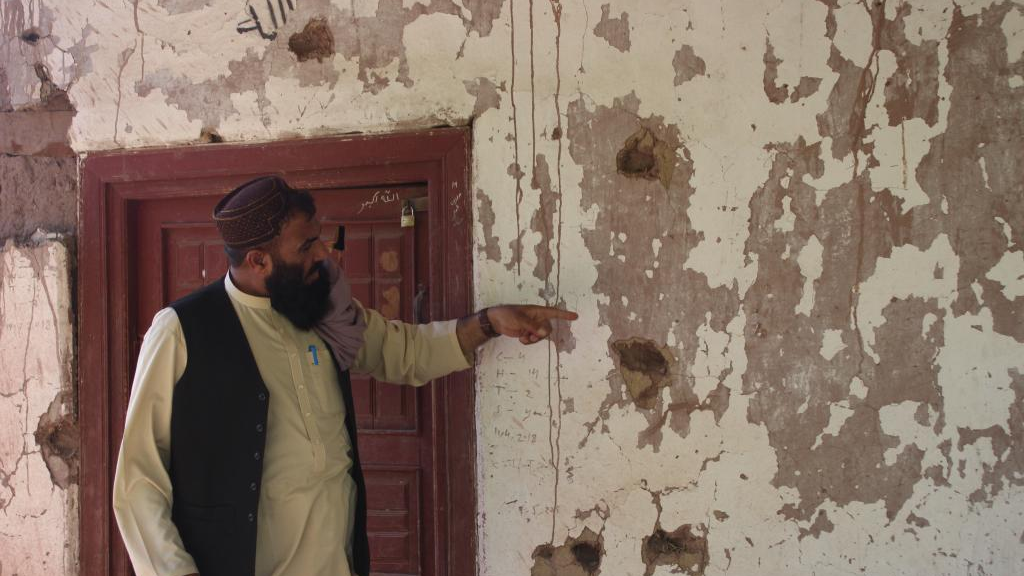
A man shows the damage of a house destroyed by bombs dropped by U.S. forces in Hesarak District of Nangarhar Province, Afghanistan, July 30, 2023. [Photo/Xinhua]
By Hafijur Rahman
As America's humiliating and chaotic withdrawal from Afghanistan approaches its second anniversary, it is reasonable to ask how much the United States has learned from its longest war in history.
Given the U.S. is currently in the midst of a full-blown proxy war in Ukraine against Russia and an increasingly tense cold-war-like containment strategy against China – as both are wrapped in misplaced narratives of battles between "democracy and autocracy" – the question beg to be answered.
The official discourse in Washington about the war has yet to slice through the misleading descriptions, terming its botched military mission as a "strategic failure" instead of an unfeigned acceptance of an outright defeat. From war advocates to architects to the cheerleaders of America's longest war in history, they are still reluctant to admit the U.S. lost in Afghanistan. This failure to accept defeat has kept the American political establishment trapped in the same misguided policies that have led to so many mistaken and disastrous overseas military endeavors in the past.
Afghanistan is no unique case where Washington has kept applying the narrowly defined analytical lens downright different from that of its people and the world itself. Nearly three-quarters of Americans believe that the United States' involvement in Afghanistan was a failure, according to a Public Broadcasting Service (PBS) poll. America's failure to acknowledge and internalize this very truth prevents it from rightsizing its prevailing foreign policy establishment which is awfully preoccupied with the same hubristic belief and enduring "strategic amnesia."
America, if it ever learned from history, has taken away the wrong lesson. It could not have repeated the same blunder in Afghanistan, had it learned the right lessons from its earlier failed war and chaotic exit from Vietnam almost half a century ago – when its then political establishment let a limited mission expand into an attempt to build "Jeffersonian democracy."

People walk in a village threatened by unexploded ordnance left by U.S. forces in Farah Province, Afghanistan, July 26, 2023. [Photo/Xinhua]
Ironically, so far, it seems that the only lesson the United States has learned from its doomed mission in Afghanistan is that the withdrawal from any war is needed to be well-planned. Yet, its drastically failed two-decade-long "nation-building" mission in Afghanistan appears to have failed to convince the country's political class that a top-down strategy of imposing Western values against the will of the masses of people through installing Western-styled institutions is always destined to fail. The Biden administration's current excessively idealistic foreign policy along the so-called existential "autocracy vs democracy" dictum has consequently fueled camp confrontations across the Asia-Pacific and beyond. This testifies to that proposition.
Riding on the hegemonic liberal illusion and sclerotic Western ideology, America embarked on its Afghan military adventurism, framing the Afghanistan challenge as "an engineering problem." They assumed that only by dismantling the whole existing state apparatus, and in place, imposing one in the way that the West recognizes the right could solve this problem. They poured hundreds of billions of dollars and established an overwhelming military dominance to fortify their nation-building machinery. But in the end, it was to no avail.
A sincere acknowledgment of defeat, other than persistently trying to smokescreen it with drawn-out preambles filled with qualifiers, admonitions, and declarations will help the American foreign policy establishment get rid of its long-standing hubristic predisposition that the application of force could somehow provide a tidy solution to dauntingly complex geopolitical problems.
A fair reorientation to the truth could also help Washington to reconfigure its long-held elitist approach while engaging with foreign governments. In its top-down strategic engagement in Afghanistan, the U.S. counted on a few ruling elites to run its starry-eyed mission, showing utter antipathy to the larger mass of people, takes on this. That resulted in the emergence of a corrupt vested interest class exploiting the system to their advantage at the cost of people's future.
The U.S. often strong-arms allies into toeing its self-serving strategic agenda, even though a large section of the citizenry in those states is opposed to its strategic posture. The Middle East could be a good example in this regard, where the U.S. has long kept its militaristic policy presence running even though 84 percent of Arabs see the U.S. itself as a threat to security.
To rightsize its current foreign policy apparatus and reshape its global militarized outreach, the U.S. must straightforwardly admit – "we lost in Afghanistan" – then put a full stop. Otherwise, its flawed policy will fester further and the United States continues to act like a classic empire and impose its will by maintaining permanent hegemony in far-flung regions of the world. And the ultimate price will always be, even worse than, what the people of Afghanistan and the world are paying now.
Hafijur Rahman, a CGTN special commentator on current affairs, is a security and strategic analyst, working in a prominent strategic studies center in Bangladesh.

 中文
中文



